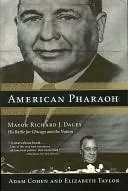
American Pharaoh
Mayor Richard J. Daley--His Battle for Chicago and the Nation
کتاب های مرتبط
- اطلاعات
- نقد و بررسی
- دیدگاه کاربران
نقد و بررسی

Starred review from May 1, 2000
Like all good biographies, this first full account of the life of Richard Daley does more than tell the story of an individual. In the course of telling Daley's tale--from his birth (in 1902) to his death (in 1976)--journalists Cohen and Taylor also chronicle the history of 20th-century Chicago. They capture the grittiness of Daley's boyhood--the day-to-day of life near the stockyards, the importance of ethnicity in local neighborhoods and the city's seemingly paradoxical combination of parochialism and diversity, dynamic growth and resistance to change. Initiated into machine politics as a young man, Daley quickly embraced the machine's values of order, allegiance, authority and, above all, the pursuit of power. Later, he ran the city in accordance with these values; the authors explain that he always assessed his options in terms of what would both enhance his power and encourage Chicagoans to stay in their proper place. Cohen (a senior writer at Time) and Taylor (literary editor and Sunday magazine editor of the Chicago Tribune) use the most famous crisis during his tenure, the 1968 Democratic convention, to illustrate how the mayor's rigid values dictated his actions--but more importantly, they say, his myopic passion for order worked together with his deep racism to shape modern Chicago. And, they argue, his legacy is a cultural legacy--through him, early 20th-century ethnic narrow-mindedness shaped everything from the character of Chicago politics to its landscape. (Constructed during his tenure, Chicago's freeways and housing projects keep everyone, especially blacks, in their places.) Penetrating, nonsensationalistic and exhaustive, this is an impressive and important biography. 16 pages b&w illus. not seen by PW.

Starred review from April 1, 2000
The legendary Richard J. Daley epitomized the political boss. Over his 20 years as mayor of Chicago and undisputed head of the Democratic machine, Daley reigned supreme. He is credited with providing the margin of victory in the election of J. F. Kennedy. Yet, his world view was that all politics was local. Daley managed to institutionalize the cross-ethnic neighborhood political machine and find consensus along class lines against "perceived threats" from outsiders. He secured this partnership during his reign by emphasizing the redevelopment of Chicago's central business area, the Loop, and securing financing to expand O'Hare airport at a time when other midwestern cities were earning a reputation as the "rust belt." But a successful balancing, if not merging, of interests could only be secured by subrogating the interests of black Chicagoans. Ethnic whites saw open housing as a threat to the tranquility of their neighborhoods, and downtown businesspeople saw the expanding black community's proximity to the Loop a threat to redevelopment. Thus, Daley used urban renewal to wipe out housing where blacks lived in problem areas. The success of Daley's balancing act laid the foundation for the current and monumental problems Chicago is facing under Daley the Younger, Richard M., the current mayor. The success of the American pharaoh may have provided the defining dilemma for his son and all who dare to follow the path of the political leadership in Chicago. This work delineates well the career of the kid from Hardscrabble, and it will surely extend his urban legend. ((Reviewed April 1, 2000))(Reprinted with permission of Booklist, copyright 2000, American Library Association.)

























دیدگاه کاربران